|
|
|
Sort Order |
|
|
|
Items / Page
|
|
|
|
|
|
|
| Srl | Item |
| 1 |
ID:
191529


|
|
|
|
|
| Summary/Abstract |
Although originating in Algeria, AQIM and its allies had by 2012 become so entrenched in the Sahel that they were in de-facto control of vast swathes of territory in northern Mali. This article explains how and why GSPC/AQIM established itself in the Sahel, and why the group eventually decided to take the fight to the Sahelian countries, where they had previously found sanctuary. Relying on hitherto unused primary sources, this article is the first to show that the leadership of AQIM and al-Qaida Central did not want to engage in direct conflicts with the Sahelian states. The eventual shift of strategy in the region was brought about by the increasing numbers of Sahelians in AQIM's southern brigades.
|
|
|
|
|
|
|
|
|
|
|
|
|
|
|
|
| 2 |
ID:
130544
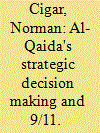

|
|
|
|
|
| Publication |
2014.
|
| Summary/Abstract |
As the united states draws down its military presence in Afghanistan, it is appropriate to revisit how the war was ignited and , in particular, Al-Qaida's role in that process. An understanding of Al-Qaida's thinking in preparing and executing this operations provides helpful insight into its decision making system and into its planning process in relation to both overall policy and, specifically, to its decision to launch the 9/11 operation in 2001.
|
|
|
|
|
|
|
|
|
|
|
|
|
|
|
|
| 3 |
ID:
083816
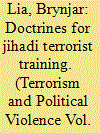

|
|
|
|
|
| Publication |
2008.
|
| Summary/Abstract |
Based on an in-depth review of jihadi discourse on terrorist training and preparation, this article finds considerable differences between leading jihadi theorists on issues such as how training should be defined, its ultimate purpose, and where and how to prepare jihadi fighters. However, they all agree on the importance of training, and that ideological indoctrination and spiritual preparation should take precedence over physical and military training. The preparatory process must produce battle-hardened, martyrdom-seeking fighters, whose primary strength lies in their spiritual determination, their patience, and a willingess to employ savagery against the enemy.
|
|
|
|
|
|
|
|
|
|
|
|
|
|
|
|
| 4 |
ID:
103212
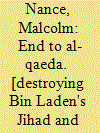

|
|
|
|
|
| Publication |
New York, St. Martin's press, 2010.
|
| Description |
viii, 296p.
|
| Standard Number |
9780312592493, hbk
|
|
|
|
|
|
|
|
|
|
|
|
Copies: C:1/I:0,R:0,Q:0
Circulation
| Accession# | Call# | Current Location | Status | Policy | Location |
| 055909 | 363.32510973/NAN 055909 | Main | On Shelf | General | |
|
|
|
|
| 5 |
ID:
130840
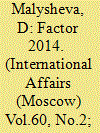

|
|
|
|
|
| Publication |
2014.
|
| Summary/Abstract |
The article examines the impact of the withdrawal of most U.S. and International Security Assistance Force (ISAF) armed forces from Afghanistan in 2014 on foreign relations in Central Asia. The possibility that the withdrawl will lead to a return to power of the Taliban movement and impact of that outcome on internal security in Tajikistan, Uzbekistan and Turkmenistan are examined. Russia's foreign relations with Central Asia are discussed in relationship to possible instability in Afghanistan.
|
|
|
|
|
|
|
|
|
|
|
|
|
|
|
|
| 6 |
ID:
191898


|
|
|
|
|
| Summary/Abstract |
In mid-2000, the publication of the anti-Taliban book Kashf Shubuhāt al-Muqātilīn caused a stir in jihādī circles. Written by Arab jihādīs based in Peshawar, Pakistan, the book made the case that it was not permissible for Muslims to fight alongside the Afghan Taliban on the grounds that the group was not sufficiently Islamic, having committed a host of polytheist acts. While some of the jihādī movement’s leading scholarly authorities quickly refuted the book, its anti-Taliban arguments nonetheless gained popularity over time. Today, the jihādī movement is divided between those who see the Taliban as a legitimate Islamic movement worthy of praise and support (the view espoused by al-Qaida and its supporters) and those who perceive it as an apostate movement standing in the way of true Islamic revival (the view adopted by the Islamic State and its supporters). The controversy over Kashf Shubuhāt al-Muqātilīn in 2000 prefigures the current divide and provides something of the context in which it should be understood.
|
|
|
|
|
|
|
|
|
|
|
|
|
|
|
|
| 7 |
ID:
073824


|
|
|
|
|
| Publication |
2006.
|
| Summary/Abstract |
Al-Qaida will end. The fear that a small terrorist organization with a loose network has transformed itself into a protracted global ideological struggle without an end in sight is misguided. There are centuries of experience with modern terrorist movements, many bearing important parallels with al-Qaida; yet the lessons arising from the demise of these groups are little studied. Unfortunately, terrorist organizations in their final stages are often at their most dangerous. The outcomes can range from implosion of a group and its cause to transition to astonishing acts of violence and interstate war. Comparing al-Qaida's differences and similarities with those of earlier terrorist organizations, and applying relevant lessons to this case, can provide insights into al-Qaida's likely demise. It can also inform thinking about how to manage and hasten al-Qaida's end.
|
|
|
|
|
|
|
|
|
|
|
|
|
|
|
|
| 8 |
ID:
099245


|
|
|
| 9 |
ID:
135613
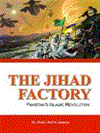

|
|
|
|
|
| Publication |
DelhI, Gaurav Book Centre Pvt Ltd, 2015.
|
| Description |
309p.Hbk
|
| Standard Number |
9789383316151
|
|
|
|
|
|
|
|
|
|
|
|
Copies: C:1/I:0,R:0,Q:0
Circulation
| Accession# | Call# | Current Location | Status | Policy | Location |
| 058054 | 322.420954/SAX 058054 | Main | On Shelf | General | |
|
|
|
|
| 10 |
ID:
085681
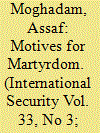

|
|
|
|
|
| Publication |
2009.
|
| Summary/Abstract |
Suicide missions made their modern debut in 1981. In recent years, however, they have witnessed an unprecedented increase according to several indicators, including number of attacks, number of organizations conducting these attacks, number of countries targeted, and number of victims. Existing explanations, including the occupation and outbidding theses, cannot account for the dramatic increase and spread of suicide attacks. A combination of quantitative and qualitative methods, including analysis of a data set of 1,857 suicide attacks from December 1981 through March 2008, suggests that two interrelated factors have contributed to the "globalization of martyrdom": al-Qaida's evolution into a global terrorist actor and the growing appeal of its guiding ideology, Salafi jihad. As localized patterns of suicide missions have given way to more globalized patterns, states must rethink their counterterrorism strategies. At the same time, because Salafi jihadist groups tend to target Muslims, moderate Muslims and nonviolent Salafists must take the lead in challenging these groups.
|
|
|
|
|
|
|
|
|
|
|
|
|
|
|
|
| 11 |
ID:
124496
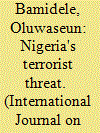

|
|
|
|
|
| Publication |
2013.
|
| Summary/Abstract |
The most immediate threat to the security of Nigeria is the Islamist insurgency raging in its north east region. Deadly attacks have killed a large number of people, devastated infrastructure, and hindered military success in this region and beyond. High ranking members of Al-Qaida may have been harbored, and the insurgents are affiliated with various militant sects, who pose a threat to wider sub Saharan Africa, especially Nigeria.
|
|
|
|
|
|
|
|
|
|
|
|
|
|
|
|
| 12 |
ID:
130546
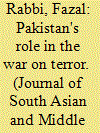

|
|
|
|
|
| Publication |
2014.
|
| Summary/Abstract |
The 9/11 terrorist attack on the United States has put the Muslim world in general and Pakistan in particular in crisis.' Immediately after the attacks, President G.W. Bush announced that ?ghting against terrorists would be his administration's top priority: "America and our friends and allies join with all those who want peace and security in the world, and we stand together to win the war against terrorism." He added that the United States would "make no distinction between the terrorists who committed these acts and those who harbor them." He put conditions before the nations of the world
to stand with the US in its anti-terrorist efforts or face US wrath. "Every nation, in every region, now has a decision to make. Either you are with us, or you are with the terrorists." He also declared that "This is a great opportunity" and "We have to think of this as an opportunity."'
|
|
|
|
|
|
|
|
|
|
|
|
|
|
|
|
| 13 |
ID:
124450
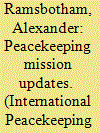

|
|
|
|
|
| Publication |
2013.
|
| Summary/Abstract |
All members of the National Commission for Dialogue and Reconciliation, including its President and Vice-Presidents, officially took office in March and April. There was criticism in some quarters that the selection process for membership had not been transparent and that there had been inadequate inclusion of religious, community and traditional leaders.
|
|
|
|
|
|
|
|
|
|
|
|
|
|
|
|
| 14 |
ID:
084658
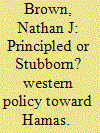

|
|
|
| 15 |
ID:
092629


|
|
|
|
|
| Publication |
2009.
|
| Summary/Abstract |
This article explores al-Qa'ida's concept of a sacred geography, focusing on the idea of "ribat" - maintaining watch on the frontier to defend Islam. Beginning in Afghanistan, fundamentalists have re-adopted this term from the hadith to characterize their struggle with the West, from al-Andalus to Palestine to Chechnya to Iraq. The implications for US policy are enormous, especially as it operates within the perceived Islamic patrimony. An understanding of ribat also helps explain why al-Qa'ida had no significant presence in Iraq prior to March 2003 but would soon thereafter.
|
|
|
|
|
|
|
|
|
|
|
|
|
|
|
|
| 16 |
ID:
093245


|
|
|
|
|
| Publication |
2009.
|
| Summary/Abstract |
The aim of Saudi Arabia's domestic counter-terrorist policy is two-fold: first, to eradicate Al-Qa'ida's capacity to threaten Saudi national security in the short term; and second, to prevent similar terrorist organisations from re-emerging in the long run. In a rare insider's account, HRH Prince Naef Bin Ahmed Al-Saud sets out the Kingdom's comprehensive response to terrorism and explains why Western countries have much to learn from its recent achievements.
|
|
|
|
|
|
|
|
|
|
|
|
|
|
|
|
| 17 |
ID:
093796
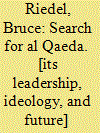

|
|
|
|
|
| Publication |
Washington, D C, Brookings Institution Press, 2008.
|
| Description |
x, 180 p.
|
| Standard Number |
9780815774143, hbk
|
|
|
|
|
|
|
|
|
|
|
|
Copies: C:1/I:0,R:0,Q:0
Circulation
| Accession# | Call# | Current Location | Status | Policy | Location |
| 054890 | 363.325/RIE 054890 | Main | On Shelf | General | |
|
|
|
|
| 18 |
ID:
093244


|
|
|
|
|
| Publication |
2009.
|
| Summary/Abstract |
Yemen is increasingly caricatured as a failed state. Such analysis obscures a more complex picture that includes prevailing dynamics of secessionism, resource poverty, demographic change and ethno-sectarianism. Alistair Harris and Michael Page argue that a narrow focus on Al-Qa'ida in the Arabian Peninsula is both analytically and practically unhelpful. Instead, addressing the broader security concerns in the region could help create a coherent sense of nationhood that will in turn challenge Al-Qa'ida's aspirations to increase its popularity and size in the country.
|
|
|
|
|
|
|
|
|
|
|
|
|
|
|
|
| 19 |
ID:
072158


|
|
|
|
|
| Publication |
2006.
|
| Summary/Abstract |
While both are convinced that "Islam is the solution", Islamists and al-Qaida represent two different views and political strategies. Islamist parties have militant grassroots participation and propose respect for the rule of law and concrete political and social projects. Moreover, the main Arab islamist parties have rejected violence as a means of political struggle. Hamas obtained the government majority by means of fair and free elections. Al-Qaida, instead, offers an undefined political platform: the restoration of an Islamic meta-state through the exhortation to Islamists to join the jihad. The political opportunities represented by the competition between Islamists and jihadists is well understood by some Arab regimes but seems to be less well understood in Western countries.
|
|
|
|
|
|
|
|
|
|
|
|
|
|
|
|
| 20 |
ID:
099240
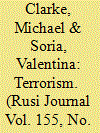

|
|
|
|
|
| Publication |
2010.
|
| Summary/Abstract |
Five years since the 7/7 London bomb attacks and almost a decade after the 9/11 attacks in the United States, the jihadist terror threat from violent extremists has evolved in significant ways, particularly as it affects the United Kingdom. Research indicates that one wave of terrorism directed at the UK has more or less run its course. But there is powerful circumstantial evidence to indicate that another phase may soon emerge and that it may be quite different from before.
|
|
|
|
|
|
|
|
|
|
|
|
|
|
|
|
|
|
|
|
|